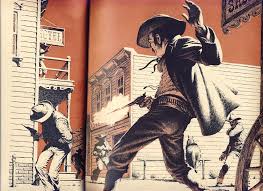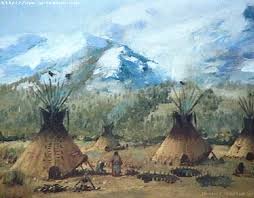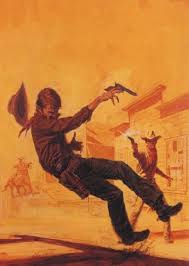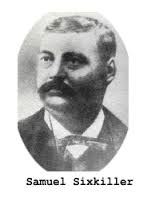Enter to win a copy of the award winning book
Sam Sixkiller: Cherokee Frontier Lawman

Willis Pettit a tall, well-built black man sunk his spurs into his horse’s backend and the animal, already moving at a fast pace, quickened his stride. The anxious rider chanced a glance over his shoulder to see if he was being followed. In the landscape he left behind there was no sign of any other rider. A flash of relief passed over his face.
Sheriff Sam Sixkiller was in pursuit of Willis and had anticipated the route the fleeing criminal would take and was waiting for him at a ford in the Illinois River several miles outside of Tahlequah. The sheriff’s horse carried him over the rocks in the shallow section of water then dropped his head into the liquid and eagerly drank. Sam swung himself crossways in the saddle, lifted the canteen hanging off the horn, opened the container and took a long swig. He carefully scanned the scenery around him as he hopped off his horse and plunged his canteen into the water to refill it. The sound of a fast approaching horse made him pause for a moment. The sheriff returned the canteen to his saddle then lifted his rifle out of a holster. Turning slowly toward the sound, he leveled his gun in the direction of the oncoming steed.
Willis and his ride emerged from the thicket that flanked the river on both sides and followed the incline to the water’s edge. The horse spooked and reared back when it came up on Sheriff Sixkiller, and Willis was thrown in the process. Before he could get to his feet, he was staring down the barrel of the sheriff’s gun. He raised his hands in surrender, cursing his luck in the process.
On May 15, 1876, Sheriff Sixkiller arrested Willis Pettit for “assault with intent to kill Emanuel Spencer with a pistol.” It was the first of many arrests for Willis in the Cherokee Nation during Sam’s time in office. Willis, a former slave, aligned himself with other ex-slaves who believed they were entitled to land given to the Five Civilized Tribes. Their belief was based on the fact that slaves owned by the Cherokee, Chickasaw, Choctaw, Creeks, and Seminoles who were freed after the Civil War should be granted a part of the territory for their own exclusive use. Not every tribe agreed with the idea, and conflict sparked controversy, and at times, violence.
Use this form to enter to win a copy of Sam Sixkiller: Cherokee Frontier Lawman
To learn more about the life and times of Sam Sixkiller read
Sam Sixkiller: Cherokee Frontier Lawman





